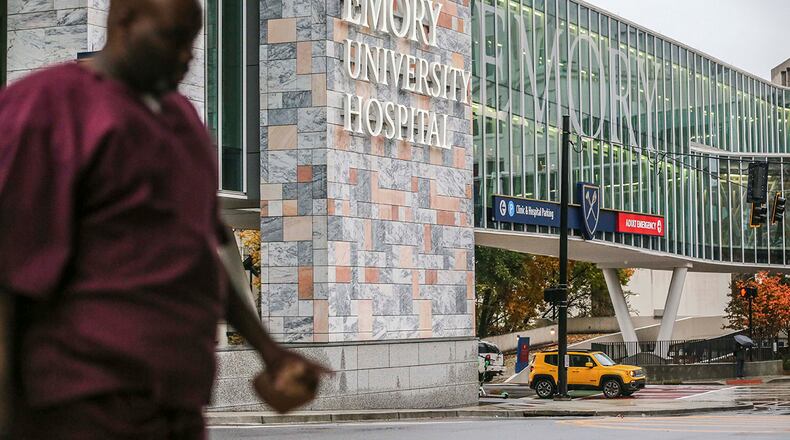Health care systems seek federal relief for coronavirus’ costs
Atlanta-area hospitals say they need more help from the federal government to stay financially healthy amid the coronavirus pandemic.
Emory Healthcare CEO Jonathan Lewin, speaking at a roundtable, said his system has totaled $15 million in charges for uninsured COVID-19 care while seeing only “a little bit” of reimbursement.
“Anything we can get is important because the financial burden, especially in hot spots, has been really tremendous on health care systems and hospitals,” Lewin told those at the event, including U.S. Sen. Kelly Loeffler and Medicare & Medicaid Services Administrator Seema Verma.
Meanwhile, COVID-19 has already hastened the death of Randolph County’s only hospital.
The Southwest Georgia Regional Medical Center in Cuthbert announced that its years of financial struggle will end when it closes its doors in 90 days.
“Even last week, we were trying to save the hospital,‘' Cuthbert Mayor Steve Whatley told the Atlanta Journal-Constitution. “But we were so devastated from March to May. We’re bleeding.”
At one point in April, Randolph County — with a population of 7,700 or so — had the highest rate of infections among Georgia’s 159 counties.
The medical center will continue to operate its family medicine clinic, which will provide services such as physical therapy and radiology. It also will keep open its Joe-Anne Burgin Nursing Home, where 17 residents have died from COVID-19.
The next-nearest hospital is 30 miles away.
Mask mandates are many, but citations are zero
Even though more than a dozen cities and counties have defied Gov. Brian Kemp to adopt mask mandates to contain the spread of the coronavirus, an Atlanta Journal-Constitution review shows that the requirements are rarely, if ever, enforced.
The AJC contacted 15 police departments and law enforcement agencies in the cities, suburbs and small towns that enacted the restrictions and found not a single citation was reported.
That was part of the plan, say proponents of masks, which top public health experts agree is a leading way to stem the disease outbreak.
Athens Mayor Kelly Girtz, whose city adopted a mask mandate July 7, said deterrence was the goal, not criminal penalties. He compared it to anti-littering statutes.
“We don’t want to give a bunch of tickets to people because there’s overflowing trash. We just want people to be good neighbors,” Girtz said. “And the mask ordinance sets out to do that. We’ve learned a lot about how important masks are — that masks equal safety.”
The legal requirement to wear face coverings has been a key part of Kemp’s lawsuit against Atlanta Mayor Keisha Lance Bottoms that contends the mask mandate and other coronavirus restrictions are too restrictive and unenforceable.
Kemp renews order placing National Guard troops in Atlanta
Gov. Brian Kemp extended an emergency order placing up to 1,000 members of the Georgia National Guard in Atlanta to protect state buildings.
The move also prolonged a source of tension between the governor and Atlanta Mayor Keisha Lance Bottoms, who have been at odds over their responses to the coronavirus pandemic.
Kemp signed the order, which will remain in place until Aug. 10, to “preserve the peace and ensure public safety,” said his spokeswoman, Candice Broce.
The extension came just a day before people vandalized the downtown Atlanta building housing U.S. Immigration and Customs Enforcement offices and federal immigration courtrooms. Several windows were broken and the building was spray-painted.
The first order, which Kemp signed July 6, followed a burst of violence across the city that included the shooting death of an 8-year-old girl and the ransacking of the headquarters of the Georgia State Patrol in southeast Atlanta. The governor then extended it July 13.
Bottoms has been highly critical of the orders.
“It’s a terrible visual to have military tanks on our streets. It has the potential to further inflame this already very tense situation. I personally think it’s overkill,” she said in a July interview. “But don’t blame that on Atlanta. Call it what it is — you want to protect your buildings.”
Credit: JOHN SPINK / AJC
Credit: JOHN SPINK / AJC
Data shows longest waits for voting in primary hit majority Black precincts
The numerous problems with voting in the June 9 Georgia primary had a greater impact in majority Black precincts.
The Atlanta Journal-Constitution, through an analysis of elections data that the secretary of state’s office reported to county election officials, found that only 61% of the state’s majority Black voting precincts closed on time on election day, when some voters waited more than 5 hours to cast ballots. In mostly white precincts, 80% closed at the appointed hour.
The AJC also found that about 11% of Georgia’s 2,300 polling places were operating more than an hour after the scheduled closing time of 7 p.m. In Fulton County, more than three-quarters of the precincts didn’t shut their doors until after 8 p.m. Eight of the 10 precincts that closed the latest were located in Fulton.
Waits also were generally longer for Black voters. Majority Black polling places with significant turnout — more than 400 voters — closed an average of 49 minutes later than smaller precincts, according to the AJC’s analysis. By comparison, similar locations with mostly white voters closed just four minutes later.
The secretary of state’s office compiled the information to help counties better prepare for the general election on Nov. 3, when in-person turnout is expected to be three times higher.
State Election Board launches 47 investigations involving primary
Investigators with the State Election Board have opened 47 investigations related to the Georgia primary since the beginning of June, according to case initiation sheets that The Atlanta Journal-Constitution obtained through the Georgia Open Records Act.
The broadest inquiries focus on counties where some of the most severe problems occurred: Fulton, DeKalb and Chatham.
The cases include several allegations of fraud, including a Fulton County voter who said someone requested an absentee ballot in her name, a Lincoln County school board candidate who thought she won before absentee ballots were counted, and a report of double voting in Decatur County. The case sheets don’t provide details, and investigations are underway.
Fraud is rare in Georgia elections, with few such cases brought before the State Elections Board since 2015, according to state records.
Other investigations of this year’s primary election involve voters who requested but never received absentee ballots, voters issued the wrong party’s ballot, county election officials accused of mishandling absentee ballots, a candidate who allegedly dropped off absentee ballots, and voters upset by the elections process.
An inquiry into Gwinnett County’s elections office will look into why voting machines were delivered after polls opened in some precincts, preventing them from opening on time.
The State Election Board can levy fines up to $5,000, issue guidance or refer cases to the attorney general’s office.
Cases can take months or years to investigate before they’ll be presented to the State Election Board, headed by Georgia Secretary of State Brad Raffensperger.
Perdue team cites graphic error in ad, but Democrats call it anti-Semitism
A digital ad for Republican U.S. Sen. David Perdue’s reelection campaign sparked accusations of anti-Semitism by Democrats because it enlarged the nose of challenger Jon Ossoff.
Perdue’s aides called it an “unintentional error” by an outside vendor, but Ossoff, who is Jewish, and other Democrats were having none of it.
“This is the oldest, most obvious, least original anti-Semitic trope in history,” Ossoff said. “Senator, literally no one believes your excuses.”
Perdue spokeswoman Casey Black said the accident was created in the graphic design process, when an outside vendor resized a photo of Ossoff and then used a filter. She said the ad was taken down to ensure “no confusion” and added that Perdue had not seen it. Perdue’s team also pointed to the senator’s record, saying he had supported a resolution that condemns anti-Semitism, backed pro-Israel and Jewish causes, and co-sponsored legislation that sought to toughen penalties on offenders in crimes motivated by religious or racial bias.
“Anybody who implies that this was anything other than an inadvertent error is intentionally misrepresenting Sen. Perdue’s strong and consistent record of standing firmly against anti-Semitism and all forms of hate,” Black said.
State Sen. Nikema Williams, who heads the Democratic Party of Georgia, called on Perdue to apologize to Ossoff, fire the vendors involved and “take responsibility for injecting these kinds of hateful stereotypes into this election.”
Koch engages in a little give and take with Greene campaign
The political action committee of Koch Industries gave $5,000 to Marjorie Taylor Greene, the top vote-getter in the June 9 GOP primary in the 14th Congressional District. Now the PAC, known as KochPAC, wants it back.
The group known as opensecrets.org, which tracks campaign spending, reported that KochPAC cited media reports of racist comments made by Greene in the past, plus her support of QAnon conspiracy theories, in seeking the return of its money.
Greene faces Dr. John Cowan in a runoff Aug. 11.
Candidates, endorsements, etc.
— Dr. Rich McCormick, the Republican nominee in the 7th Congressional District, has released a list of 120 people who have joined a “Faith and Renewal Coalition” that supports his campaign and its anti-abortion platform. Members include Gwinnett County Commissioner Jace Brooks, Forsyth County Commissioner Dennis Brown and state Rep. David Clark, R-Suwanee.
— Carolyn Bourdeaux, the Democratic nominee in the 7th Congressional District, picked up an endorsement from Stacey Abrams.
— Teresa Tomlinson, the former mayor of Columbus who competed earlier this year in the Democratic race to face Republican U.S. Sen. David Perdue, has endorsed the Rev. Raphael Warnock in November’s special election for the U.S. Senate seat held by Kelly Loeffler.
— Joe Biden, the presumptive Democratic nominee for president, announced the members of his senior leadership team in Georgia. Serving as state director will be Tracey Lewis, who was Hillary Clinton’s senior adviser in Georgia in 2016 and a key deputy in Michelle Nunn’s 2014 campaign to capture one of the state’s two U.S. Senate seats. The two senior advisers to Biden’s campaign in the state will be former state Rep. Simone Bell and Tharon Johnson. Also on the team are Reese McCrainie, who will serve as the campaign’s coordinated deputy director, and Dominick Perkins as its political director.
About the Author
Keep Reading
The Latest
Featured






